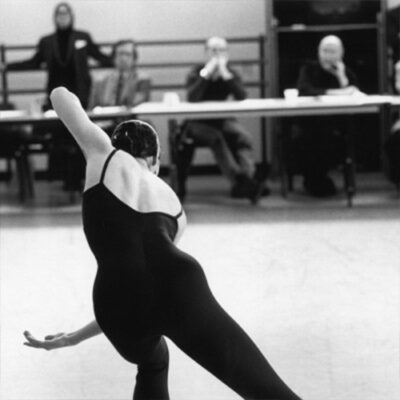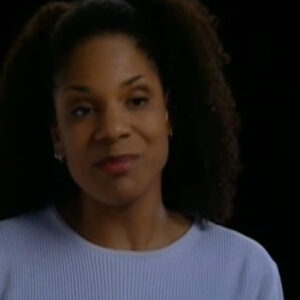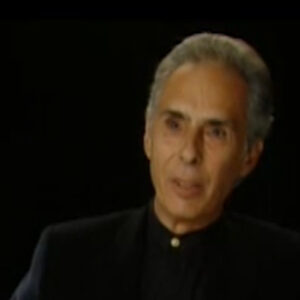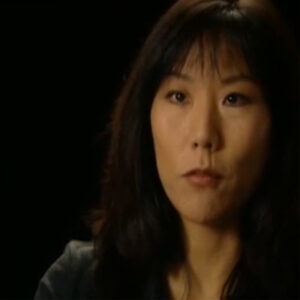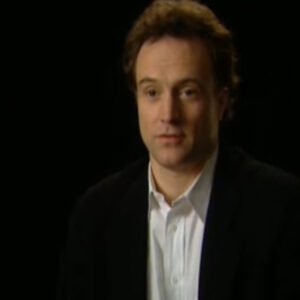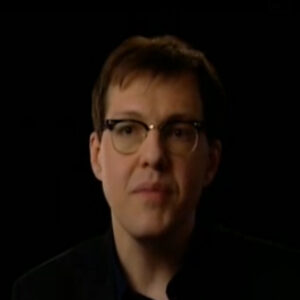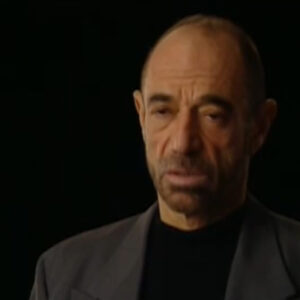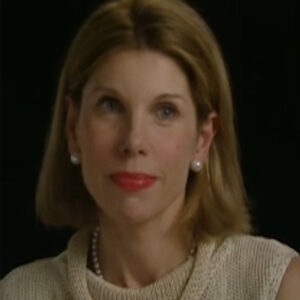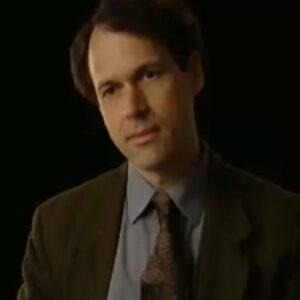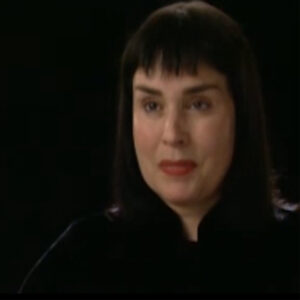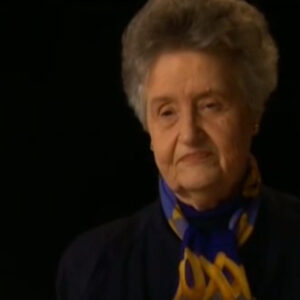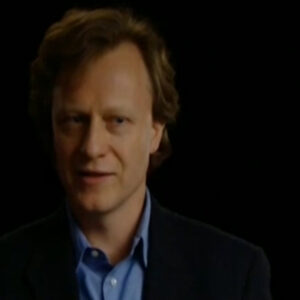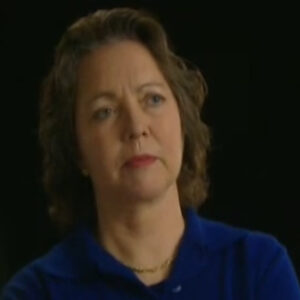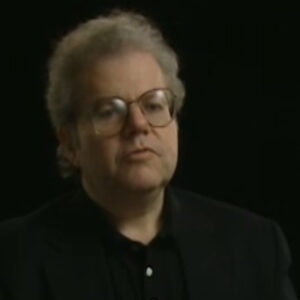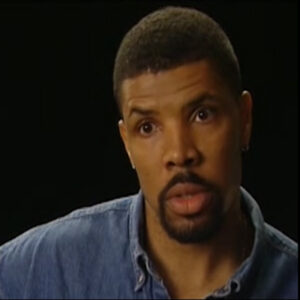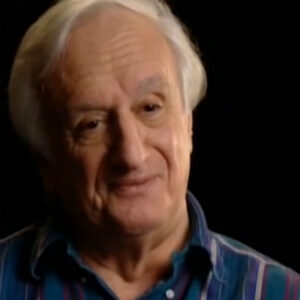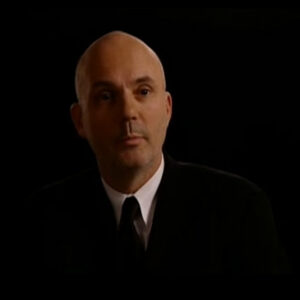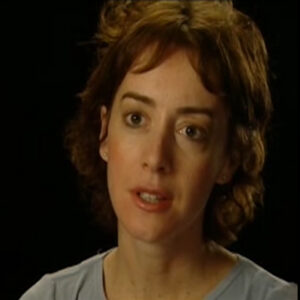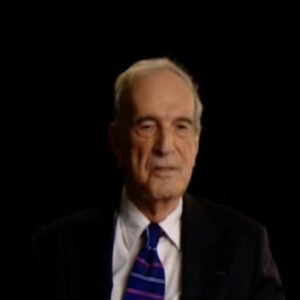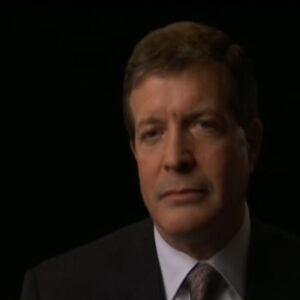Speaker Well, I have experience of going to Chautauqua in it’s an artist colony in western New York and worked with Richard Feldman there, who was a teacher at Juilliard. So that definitely got me more interest in Julia. But, of course, it already hurt. I went to undergrad at Duke and there were a lot of people who had already gone to grad schools. And I definitely had heard of, you know, Kevin Spacey, of course. And I mean, I went to see a lot of theater. So you always see Julia in people’s bios. And I think I know is an intense but also a lot of technical training, which I also interested me and I think for years, I like the idea for years, too, because I think it was you sort of would have time to get worse before you get better. And that appealed to me the idea of a long commitment, because you sort of think about spending a life doing that. So four years isn’t really so long until you get there. And then and then it’s a long time, but. So, yeah, a lot of things. I mean, but definitely that the technical aspects of the training appeal to me.
Speaker And when when you auditioned.
Speaker What was that? What was that like? I know that you auditioned either more than once. Yeah, I just twice. Fascinating, because, you know, you’ve had the experience of not getting in and what that felt like. Right. The experience of getting in. I mean, tell me about the first audition and sort of how you felt after the first time I auditioned.
Speaker Well, I think the first time I auditioned, I just met Chicago and. And I think I was trying to get it right and sort of show them what I thought they wanted to see, which was, you know, really big, big acting, really. You know, something very classical. And I think the second time around, I sort of did what I wanted to do and thought, you know, if I do something that I love, then, you know, that will ship hopefully show me off at least for what I want to do. But the first time I auditioned, I am really so nervous and I remember sitting there were like three of them, John Sticks and Michael and Liz Smith, and they were all staring at me in this chair. And I just kept coughing because I was so nervous. I kept clearing my throat. And John Dick said, What is that? And I said, I’m getting in. I think I’m getting allergies, like, I must be getting sick. And of course, he knew that I was, like, nervous, and that’s why I was coughing. So I think at that point, I sort of wasn’t in a position to, like, be honest, you know, all the time. And I was a little guarded. So I think that sort of, you know, got them interested in me, but it sort of wasn’t I wasn’t quite ready yet. I don’t think to get a score.
Speaker And an.
Speaker Was it a huge disappointment or was it almost like expectation? I mean, what did it feel like to go there, even get called back? I mean, how did that feel?
Speaker Well, I didn’t think I was going to get called back and I was actually leaving. And Kathy had called me and said, I think you should stay. And then I saw that I’d been called back. So I was sort of in shock, I think, for the entire time, even during the callback. But it was it was definitely disappointing. But I knew that I could take some time off and apply again. But it was it was definitely hard, too, because leaving under God, I sort of wanted a plan for myself. And that kind of left me with no plan. And I really wanted to go to Juilliard. So it was very hard not getting in and kind of deciding to come to New York anyway and get a job and wait and see if it happens again.
Speaker And what what was the what is the audition? We’ve been there and we’ve seen it, but if you’re you’re seeing what we’re seeing.
Speaker I mean, how horrifically how it seems like.
Speaker On one hand, it’s not that scary because barely anybody is going to get it right. But, I mean, what how did you experience I mean, getting in, it seemed. Yeah. Just the whole process of sitting in those holes.
Speaker Well, it’s sort of like being on a drug, basically, because you’re you sort of have to, like, be at your best. And that’s sort of either gonna happen that day or not. You know, I mean, like, if I had audition the day before, maybe maybe I wouldn’t have gotten any sort of everything to sort of ask to come together, I think, for you at that one point and. Yeah, it’s intense, it’s intensely nerve racking to have all these people. But the good thing is that you sort of don’t know as much about acting. So you’re kind of just doing what you do and you’re sort of not able to pick it apart yet. So in a way, it’s sort of freeing. And I think, like, I don’t know if I could go through that again, because I know so much about, you know, I can break it down so much more and say, oh, my God, I’m not listening, I’m not talking, I’m hiding. I’m all those things that they give you, you know, that really sort of at first make you very self-conscious. You don’t have any of that. So in a way that’s sort of on your side kind of cause you’re just going for it, you know, and not apologizing for it. But I think a year into school, if I had to get up in front of the faculty and do two monologues like that and it’d be completely different. And that’s how the monologue Schelling’s are. It’s very different. And each year it’s very different.
Speaker Well, I wanted to ask you actually about that, the one love shown, because, of course, they are kind of Holy Father. Oh, it’s like a pep rally. It’s you have your sip of water.
Speaker Oh, sorry. You don’t have the vodka shot right now.
Speaker Of course. Okay. You hearing that back? I did, definitely.
Speaker You know, I it’s interesting to me that, you know, you could probably hear, you know, it’s a very funny kind of opening to the year. I mean, I mean, what would you say? I mean, about them, the whole idea of the. Why do you think they have them? We with what is it for you?
Speaker Well, I think every year it’s very different. And there’s certainly nothing like that at school.
Speaker That’s sort of where you go. And everyone really just wants everyone to do so well. Because the the better everyone is, the more the more talented you feel because you’re like a part of this huge thing and it is like a pep rally. I mean, people say where they’re from and everyone just goes goes nuts. You know, it’s really it’s so affirming. And, you know, you can either leave feeling like a genius or feeling like you blew, you know, your first chance of the of the year to say something about what you want to accomplish that year or. Yeah.
Speaker But it’s just really fun. I think the second year was the most fun. I think for me, just because you spend that first year, like, breaking everything down and feeling so self-conscious and you sort of come back from the summer, like fueled up like like your tank, like fall.
Speaker And, you know, you’re thinking you’re gonna attack that year and, you know, prove some things or at least make some things happen for yourself. So. Second year was really the modelling shows are really fun for me.
Speaker Do you think that the faculty is really looking at you very intently now that it’s in, again, some way to work? Or do you think that it’s just about the fun of it? In a funny way, it’s lifting people up. It’s giving them a chance to do.
Speaker It’s interesting. It’s sort of, I think whatever you want to make it in there, definitely years where I I think that was what was so fun about second year for me, because I sort of told myself, like, I know people are gonna be out there taking notes and looking for, you know, voice and speech things and, you know, body things. And definitely people are taking note because they want to know where you are that year and where where you’re heading. But I think you can sort of choose to look at it like that, or you can say, I’ve got all these people in their room and they have to watch me for for ten minutes. You can sort of do whatever you want. It’s really your chance. Or you can work on something, you know. And so every year, I think people make it about something else. You know, it’s either a talent show or or it’s you’re really working on something. And I think people sort of can they know you well, sort of know where you’re heading with your choices.
Speaker You know, I also ended up seeing to the board.
Speaker Oh, yeah. I’ll get over yourself. Yeah. Well, yeah, well, it’s a little bit of the like.
Speaker It’s a huge farewell. And for some people it’s like a big like you go to a lot of people, you know, things that they didn’t get to do or that they want. I mean, you have it’s like you’re you’ve trapped all those people. They have to watch you for ten minutes and they limit you to ten minutes for some people there, you know, to a little performance art, little thing and, you know, a little dancing, sort of whatever you need to get out. You know, it’s but it’s it’s an amazing thing because there there is the feeling when you go in the room that everyone wants everyone to do so well and that because it just makes everyone else feel talented to be a part of something that huge. And it’s very powerful.
Speaker Yeah, I mean, they’re very funny, you mention voice and speech work, and I know that, you know, because I’m thinking about it right now, because I mean, we’ve talked about it, of course, tons of people.
Speaker It’s the you know, it’s a trademark of the school and a lot of ways because they really, I think, do it more text work than any other place like it. They have more time to do it. But I do think there’s a lot of there’s a lot more class time spent on text work and on voice and speech.
Speaker It seems. Well, give me a perfect example, demonstrate a perfect example of what you sounded like when you came to what?
Speaker Because, you know, it’s like they talk about something, you know?
Speaker Right. Well, you listen. You listen to a tape of yourself. You do a tape when you first get to school, like the first week. Ralph Zito taped us doing green fields, fleeing sheep, like all these sounds. And you do you read a piece from Madame Bovary, I think. Anyway, you read that and then you listen to your tape like two years later and hear it. And it’s hilarious. I mean, it’s it’s noticeably different.
Speaker I sound like a small child from the south. And then the second time, it’s sort of like someone trying to be a woman, but not really very yet. But it’s sort of you really recognize such a difference in your sound. And I mean, I just I smiled all the time. And so all my sounds were sort of influenced by by that. And then I gradually sort of relaxed a little bit, which I’m trying to do right now.
Speaker But like when you came in. Did you have a heavy Southern accent that you didn’t know how to speak without? I was working on it because I went to all the what it would.
Speaker I’m sure you can do it now. What did your Southern accent sound like?
Speaker Sounded like this. It was. I don’t know. I just said like my momma and my daddy and like talked about when I would talk about home, my accent would come out coming out right now. I think just from talking about things from home. But you. Yeah, it’s very hard. And anytime you get mad or really tired, it comes back. Or find drinking. He comes back or, you know, it’s it never goes away. I don’t think. But in your truest moment, she’ll probably reveal yourself. And because that’s how you thought. As you know, for 20 some years.
Speaker So it’s it’s bound to come out. And it does.
Speaker But you work on it. I mean.
Speaker Oh, yeah. I’m still working on it. I mean. Yeah, I think you’re always working on it and you sort of get to a place where you have a voice that you speak from that you feel comfortable with it. You know, we’ll work for you. But there’s always times where I find it coming out like I sound. It’s very hard for me. Like and I always it’ll come out. I have to speak really faster.
Speaker You’ll hear it. Definitely. But I’m working on it.
Speaker I think you actually have to say just for the very beginning that where you’re from, I mean, where are you from originally?
Speaker I’m from Linette, Alabama. It’s like an hour south of Atlanta, Georgia, right on the Georgia Alabama line. It’s coming out now.
Speaker I can say Alabama without sounding sounding like I’m from there, but yeah, Lonette, Alabama, that’s where I’m from.
Speaker Well, you know, when we talk to a lot of people, certainly when we’re there now, because they’re in the middle of it, yeah, they. There’s a lot more about the struggle, the continual kind of. And there is this kind of Tulear cliche that you go in and they sort of strip you down and rebuild you back up. I mean, this is this is not, you know, ancient history for you. This is.
Speaker And when you’re there, you’re right in the middle of it. But even just remotely out of it.
Speaker How much does that mean?
Speaker How do you perceive what’s going wrong when you’re there, you’re just in this? I mean, we talk about somebody like, you know, whatever. Videojet having issues, right? Oh, yeah. Hold on. Self doubt, struggle, angry. I mean, were you just in the midst of that kind of thing yourself? Oh, yeah.
Speaker It’s very hard because I think sort of some of the ideas that they have for you or the hopes they have for you, for the kind of actors that they want you to be, isn’t always sort of what you want to me.
Speaker And so I think when you get out, it’s sort of you have the chance to really just, you know, evaluate what. What do I really want to do? You know, if I if I never do that, will that will that be OK? You know? But in school, it’s sort of you you’re you’re opening your eyes to all, everything or everything you could do. But I think on you, you get out you sort of you’d actually trust yourself more, I think, because you’ve been broken down your spine, just kind of bounces back. And you I think it takes a long time, you know. But I think ultimately, like after you’ve picked yourself apart, you’re, you know, inevitably going to be stronger and know what you want even so much more. Now, how you’re going to get it is another thing. But but I do think it will make you. It makes you stronger, but it takes a really long time. And it’s really hard to feel that when you’re in school because you’re so concentrated on yourself all the time. And it’s so it’s such a it’s so important, but it’s such an unnatural state to sort of always be wondering how you how you’re doing. And you sort of the very thing you need to do is sort of get outside yourself in. And I think about think about someone else, but you can’t. And that’s sort of there’s nothing like it. You’ll never they’ll never be four years where you can actually only think about yourself for that time, how I’m how I’m breathing, how I’m sitting or talking or just the minutia is it’s overwhelming. It’s very petty. It’s very petty existence. Being in school and when you get out, you sort of can’t remember what that was like. You know, like I see my friends who are in school there now and you see them and it’s like it’s like a head explosion. I mean, you run into them on the street and you know that that’s how it was for you. But you can’t even remember it because it’s it’s very intense existence where everything is so important. And it is because you have no other life. I mean, you’re there from nine in the morning till 11:00 at night. And those people are here, you know, your friends and your family and your, you know, boyfriends, girlfriends, everything wasn’t for me. I mean, I didn’t date anyone in my class, which I’m really glad I didn’t didn’t do that. But yet everything is you’re it. You’re totally hooked up to that for your life. So seeing people on the street is always interesting because, you know, that’s how you were. But you can’t get your head inside that again because it’s such you can only feel it when you’re in school, feel what it’s like to have everyone say it’s a great reactionary space, you know, and you won’t have that when you get out. But you don’t know that at the time. And five plays a year’s exhausting. It’s not like a treat. You know, when you get out, you think, God, what I wouldn’t dare to do, you know, give to do five plays a year. That’s incredible. But you can never appreciate it when you’re when you’re there.
Speaker We’ll win it. It’s funny. So in a way, what you’re saying is you’re you’re in this tiny, tiny minutia.
Speaker And you drop it really quickly. Exactly. I mean, that’s an interesting thought. And also, I mean, when somebody like Robert School comes in at your house and they’re going on and on and on about it, you feel like it’s over yourself.
Speaker You know, it’s sort of it’s sort of interesting. And it’s some.
Speaker I don’t know, it’s sort of fascinating to see someone who’s still there and going through all of that because in a way it does make you say, thank God my head isn’t exploding like that anymore, you know, and it it does on occasion, you know, after an audition, you have the you know, these awful ising occasions where you you know, you’re obsessing about something. But for the most part, he couldn’t get away from it. I don’t know. There’s there’s a different joy in the work when you’re not in school. I think there’s a huge truth to that. And. It’s interesting seeing people when they’re in school and it is sometimes so agonizing. For people, but I’m saying them I don’t know, maybe it sounds a little sick or something, but it’s sort of comforting because you think, God, I remember when I was like that and thank God it’s not like that anymore. You know, although you have days where it’s like that, but it sort of can sort of be envious because God knows, if I could do it again, I would probably do things differently. You know? Definitely, but that’s why you can’t do it again.
Speaker The whole process, I mean, is getting out, which is very recent. You. Did you sort of sense I mean, describe a bit the whole process of the leaks, which we also knew and you know, I just want to ask you one question, just to be sure, maybe after this.
Speaker Do we need to put it sounds like a little black, this whole window because of construction? Yeah, it’s not really the big problem now, is it?
Speaker No, it’s not right. OK, I can do it. I don’t know. I don’t know. I know what we’re we’re not gonna be able to because she’s gonna have to go. So we’ll do it when she runs out. But yeah.
Speaker So what about the way that’s the leagues about getting out of that, you know about. Well, it’s sort of when the competition really begins in a funny way.
Speaker It still begins when you’re still in school. Yeah. That’s a variance. Was like. Yeah.
Speaker The leagues, it’s a very unnatural time because you’ve done everything together and everything you’ve all been working on the same thing in your life has been the same and you’ve all had the same struggles. And then everyone. It’s interesting because about three weeks before that happens, everyone’s fighting. No one can get along.
Speaker Just it becomes the tension is you can feel it rising. I mean, everything in the cafeteria, it’s people are just different, you know, and people start like getting out their outfits and, you know, getting their personality, what they think the world wants to see, sort of like grooming themselves for that. And it’s very unsettling. And then what happens is, is that some people do extraordinarily well and then others don’t. And it really, you know, so often doesn’t say so much about the talent as it does about what the world. What the world needs are what the world, you know what, casting people. Who they think will work and sometimes they’re right and sometimes they’re not. And it’s very unsettling. It’s like I tend to know that not everyone is going to. That’s the first time you realize that we’re not all going to have the same path. And although you knew that from the beginning, it’s very it’s very upsetting to see some people. Oh, my God. Like, you know, you’re in rehearsal for your rep shows. And they’re people, like, looking at sides for huge, you know, new series or a new film or. And then other people, like don’t even have an agent call any calls, you know, or any appointments. And other people are late because they have so many appointments. They can’t even schedule them all. So it’s very, um, it’s very upsetting. It was very upsetting for me just to see everything sort of fall apart. And then you come back to you come back together again. You know, eventually, because you’re all sort of humbled by the end of it. But it’s very, um, very unsettling.
Speaker I’m kind of a classic thing that we’ve all been talking to all these people and a lot of them are out and as you said, you know, not everybody’s going to have a career. If you look back, you know, there’s only, whatever, four or five people.
Speaker And then there’s also the career of being a movie star. So everybody knows who you are or having a very significant life in the theater. That is a great career. But not everybody knows that. Right. So there’s kind of two different things. But I mean, I think one of the really critical things about having somebody who’s just at your base is kind of looking at this this thing of how hard is it to get out there? What is it meant when you go on auditions and Julie arts on your resume and what I mean, you know.
Speaker Well, I definitely think it means a lot. I mean, it’s definitely I think helps you get appointments. Certainly.
Speaker I mean, I know you said he’s going to Juilliard.
Speaker Well, I definitely, I think means a lot to have gone to Juilliard. And I think that you definitely get appointments just from having Juilliard on your resume or having gone through that, someone’s bound to have seen you in those four years do something. And. And I think you meet a network of people. The first job I got out of school was with Joe and I colitis. And she had seen me do things at school and I guess play readings and, you know, shows that we had done at school. And he’d remember me from that and called me in to audition for her show. And another job I had was a new play that I had worked on while I was at Juilliard and then did that with three other Juilliard people from all different years, which is great because you never get to work with people that aren’t in your group while you’re in school. So I think it means a lot. I certainly feel a lot of the connections I’ve been able to make or from school people that, you know, directors that I worked with or that I met through Juilliard or, you know, teachers recommending you for things.
Speaker So is it scary? I mean, if you get out there and then in a way, this safe little world and then suddenly.
Speaker He didn’t seem to feel floundering or did you see? I mean, it’s like have you seen a lot of classmates kind of flounder or fly? I mean, is it.
Speaker Yeah, I mean, I think we’re all sort of floundering in a way, just because we’re sort of.
Speaker It’s it’s it’s hard to feel like an actor when you don’t have a job. You know, you don’t have an acting job. So I think certainly you see people and some people are doing so well and being out of school is really, you know, been amazing for them and really look for least huge parts of their personality and other people. It’s really hard. I think it’s hard for everyone to be out of school and realize that you’re in there not knowing all the time. You. You’d never know when your next job is coming. That’s hard. So I don’t know what. What do you mean?
Speaker That is what I do. Because, you know, it’s like you’ve been in this school where there’s all these expectations and you’ve gotten into the hardest get into it. Right. And then you have to go to one hundred and fifty auditions and be accepted or rejected. All right. I mean. Right. And no, I needed to go all the way. It’s like keep your eye on the ball because. Exactly. Not going to be tomorrow. Right. You know, I mean, I’m sort of thinking about it.
Speaker I think it’s hard when you’ve been to Juilliard because you you tell yourself, oh my God. I spent four years doing this. I ought to have a job. And I still don’t have a job. And that can be hard, you know, because you’ve you’ve worked so hard this far. And yet it’s still that hard to get a job. And that’s really that’s really hard to realize how many talented people there are. I mean, you were with 20 of them and you go on auditions and there’s trillions of them and that and they’ve spent more time in the real world. And I think the more time you do spend auditioning, the better, the better you’re going to get, because there’s things that you just can’t learn in school about auditioning. And because it’s a very brief moment in a in a very long day for a lot of people. So making an impression is it’s very hard. And Juilliard certainly gives you the tools to go in and, like, make an impression in 10 minutes. But, yeah, there’s some things you sort of can’t prepare yourself for. But I do think, you know, it’s hard because you’re sort of you have all these tools at your you know, your command. And then at the same time, you also have the tools to to break yourself down as well and to say why it didn’t go well.
Speaker And I think sometimes it sort of envious of people that kind of you know, they leave in there like that wasn’t really a good you know, I didn’t go well. And for me, it’s like, you know what? You can sort of begin to agonize about why I didn’t go. Well, because you spent four years, like, knowing that you have these tools to make it to make it happen.
Speaker If if you want to. And then you didn’t. And why didn’t you listen or why did you hide or, you know, why did you make a choice about that or. So it’s sort of they give you the tools to help you. But at the same time, it’s also the tools that you have to sort of. OFA lizer agonize over, which makes it interesting to.
Speaker But one thing that you said, I think is kind of a positive, certain important point is that, you know, we were saying that if you have a sense from having gone to the school of the longevity of a career, also a rite of knowing why you want to do something not you know, you’re not you’re trying to be an actress here or an actress. You’re not trying to be famous for 15 minutes. You know, it’s right.
Speaker There’s a larger I mean, do you feel that way? I mean, why am I saying this barely?
Speaker Does it give me a peace?
Speaker You mean to know that I’ve I have trained and I have that and I can use that. And if I’m I still love acting. And if I’m not working, I might be working in 10 years.
Speaker Is that is that what you mean? Well, I’m also thinking. Well, I mean, you’ve done some work. I mean, you’ve done some work. This is the beginning of a road. It’s not the beginning of a driveway.
Speaker Exactly, Max. No, it’s. No, it’s true. It’s very true. You.
Speaker Yeah. It’s exciting to know that you can. Do so many different things. And there’s so many different types of plays and different careers. And I don’t know.
Speaker I don’t know. I don’t know. I’m sorry.
Speaker I guess what I’m thinking is, I guess what I’m thinking is, you know, how important is it to you to be an actress, considering, you know, how little it’s going to be? Hard. But I mean, what what keeps you warm?
Speaker What what’s like my faith? What’s like my my image that I like. I think about.
Speaker God, I mean, I I love I love people in the theater, and so I think that makes a long day very worthwhile to spend it with people that also do what they how many people get to do what they love? I mean, very few. And I think, you know, it’s like it’s like getting a drug for a small amount of time. And if I can work for for six weeks, that that can probably fuel me for like six months. You know what I mean? And that’s that says a lot. I mean, it it’s it’s like there’s a joy that you get from that that I don’t I can’t imagine getting from anything else. I mean, it must be like. It’s creative and it’s also getting to make something. Mean it’s creative and imaginative and get to produce something it’s like must be like having a child or something which will probably never get old. You know, I would I would think, although I don’t know yet. But.
Speaker Yeah. Also, one thing that got set gets hit a lot is that you get on this thing with uniquely yourself and then you become this Juliar person, a little huddle. The thing that you’re part of right now, which is when you’re two years out, is getting back to that thing that was you.
Speaker But with the training, you know, taking the technique of the training by yourself, being a full part soundstage, basically like being as interesting as you are in life on stage are not half as interesting a Juilliard clone.
Speaker That’s the biggest criticism that you’ll come out of fear is that voice. I’ll go first here. I mean, do you do you experience that kind of sense of becoming yourself again? Yeah, I think it’s cool. And what does that mean?
Speaker Like, oh, I think it takes a long time to to become fully taught to integrate everything into your your craft and make it look like you’re not crafty. That’s very hard. And I think it takes may take like seven years before that doesn’t like seep in in moments, you know, because I still have you know, there are times when I worry about not being understood. And so I go over it over articulate or you sort of I think you learn that at that point you’re sort of in the worlds and you begin to learn from the people around you and sort of see, pick and pick, pick things up from them as well to add to your little tool box, you know. But I think I don’t know.
Speaker I mean I mean, I find that people are. Know that if you you know, you worked you went to Julia, that you you’re very trainable and you can take notes and make adjustments and, you know, so hopefully that’s in your favor. You know, you have you can make adjustments. But I do think it’s very it’s very hard to know when you’re being to Juilliard and when you’re not and when you’re. But usually if there’s joy in it and you’re having a good time, there’s a good chance people are going to forget about the fact that you probably went to Juilliard and you might be speaking a little loudly or, you know, I don’t know, chewing up the scenery a little bit, which I think is probably a Juilliard thing as well. But God, sure, it’s fun, you know. I mean, it’s theater, for Christ’s sake. Why not? Why not take it a little over the top? That’s where the fun is. You know, and to deny the fact that you enjoy performing is is to deny part of that from for me, from my process. It’s a huge part of the joy of it. So is sometimes having a big voice or a big body or, you know, it’s fun because, you know, you can go to Kmart and see all those other people that are mumbling and I don’t know, picking out Twinkies. But if you can sort of add something more to that and be larger than that, it’s really fun. And I think Julia actually gives you the tools to do that. And I think it takes a long time to sort of do Shakespeare, but also be yourself.
Speaker It really takes a long time, I think. I mean, God knows I haven’t gotten anywhere near that yet, you know, sort of one extreme or the other.
Speaker Yeah, well, one last question, because we know that you were part of this whole pier thing. I forgot to bring up earlier. Yes. I went to France and I met. Yeah. It’s like, you know, living. Oh, this you, Mr. Sweetheart. Kicking his dog. Oh, don’t tell me.
Speaker Oh, Fred. Yeah.
Speaker I mean, those masks like the masks from Powers class. We still my friends, I still talk about them. I mean, when we see people in the street, we like refer to them as that mask in pairs class. That one would like the eyes cut out and like a little mouth and you sort of they’re still part of your life. You remember them. I mean, you had to put them on five times a week and you definitely get to a point in his class where you have no more characters. They all your characters start to sort of be the same or they’re sort of derived from the same. Same place, same character. Farm, sort of. So to speak. So you really get to know those masks very well and they sort of come back to haunt you. Or when you’re working on things, you do think about them and and think about how they informed you and transformed you. But he’s he’s he’s remarkable. I mean, he put on the little boy mask and he he turns into a magic, like magically turns into a little boy. It’s and he’s I don’t know how old he is now.
Speaker One hundred now held this, he must be like 80, some 80 something I don’t even know, but. But he he still can, like, cough and then create a character from that. That’s a huge lesson.
Speaker I mean, if you can find the way someone laughs, he can find the way they speak and the way they move and how they’re happy or sad or. But it it’s it’s a phenomenal way of of teaching. And he certainly loves it so much. And he brings such joy to it. And he loves anything even when something’s well, when something’s off. Or he usually says it wasn’t very good, was it. And he usually sort of you know, we’ll say, you always know where you stand with him. But for him, it’s not about being talented or not being targeted.
Speaker It’s sort of. Did you bring joy to it? Did you love it enough? You know, which is a huge, huge lesson.
Speaker And when he retired and you’re here. Yeah.
Speaker Yeah. My read might be that he retired. That would be great. Yeah.
Speaker No, he actually retired the year that I retired from Juilliard. No. Thing here that I left graduated was his last year in school. And. They had a huge celebration for him at our wrap party at the end of the year, and it was an intensely moving party that had people, everyone reading letters from so many famous people and people that have had careers that no one knows about as well. Talk about peer and what you know, what he what it meant for them. And I mean, you’re just struck by how many people he affected. I mean, I don’t even know how long he was teaching, but I mean, since the inception of the school, he’s he’s been there. That’s a lot of a lot of people have put on those masks and created, you know, people out of them. And I know that’s that’s an it’s an amazing thing. How many people have had been touched by him?

